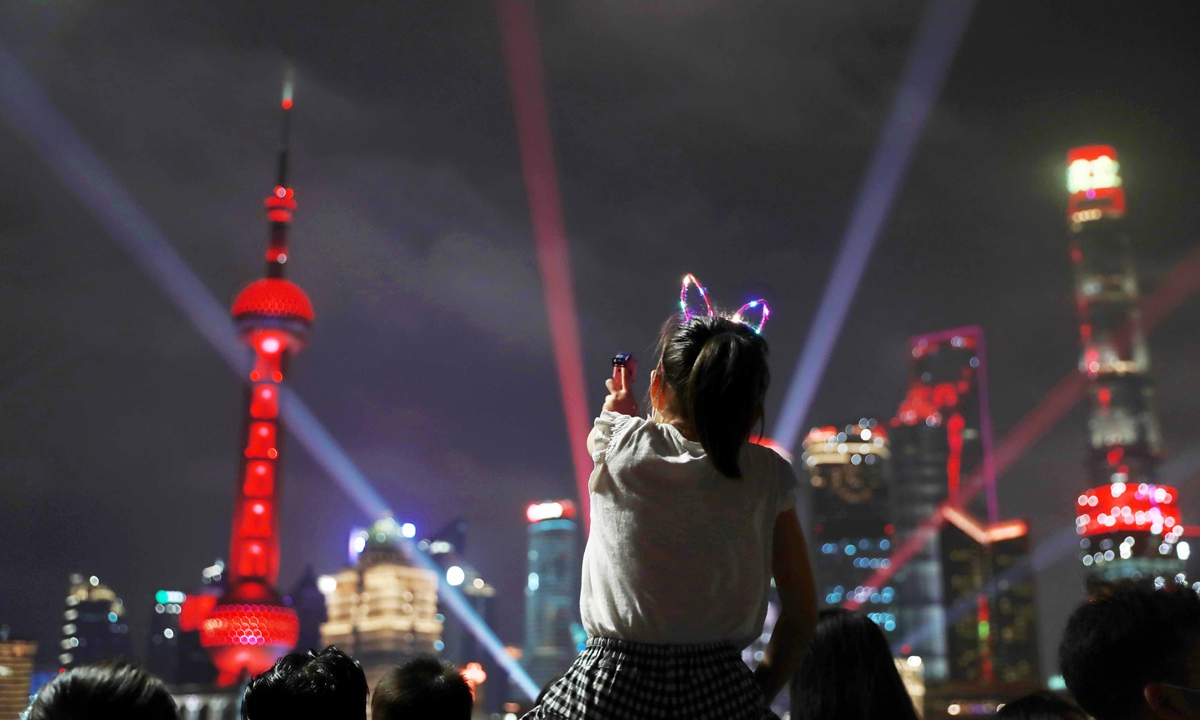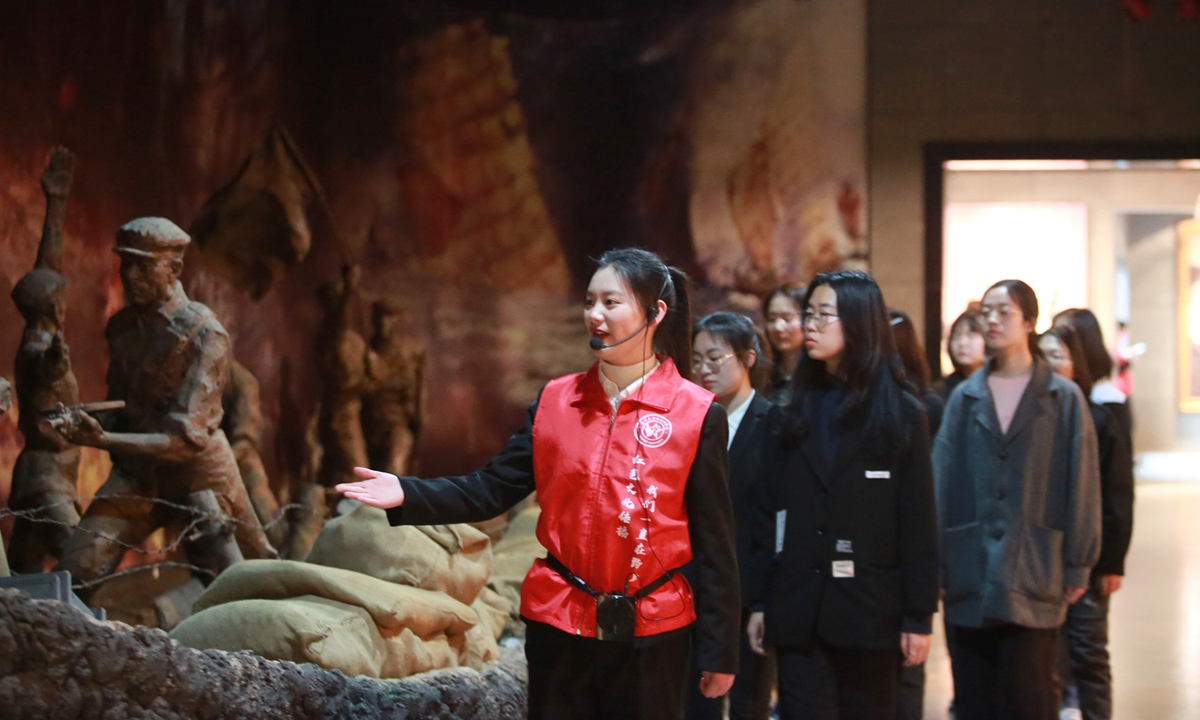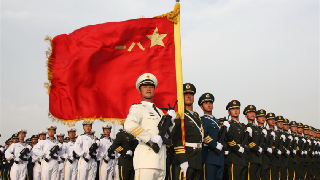By Zhaoyusha,Chen Qingqing and Cao Siqi
Editor's Note: The Communist Party of China (CPC) is preparing to celebrate its centenary anniversary on July 1, but it still shines with young vitality, as more than a third of its 92 million members are under 40. How did the centenarian Party, founded by young people, still manage to engage in young people? How do Chinese youth today, who grew up in peace, showered by the country's booming economic and social development, and who are the cohort most exposed to the West, view the Party differently from their parents or grandparents? Does the passion for contributing to the Party remain strong in those youngsters?
This is second in a series of reports to decode why the CPC is the destined choice for the Chinese people, why it can rise above the challenges and tests over a century, and what is its secret code to success in governing such a vast country and implementing effective economic policies that have created an economic miracle for China and the world. The first explored how the CPC withstood storm after storm and overcame crisis after crisis and how firm leadership became the key to the CPC's success.
It was just a normal Thursday in early June, except for the long line, made up mostly of young people, formed in front of Tiananmen Square at 2 am. They were waiting for the daily sunrise flag raising ceremony held at the Square. Two hours later, the moment the Square was opened, the chirpy crowd of youngsters raced against each other to get to the front, eager for the best angle to take selfies with the gleaming national flag in the background.
A dozen or so university students, all members of the Communist Party of China (CPC), said they were there to pay tribute to the Party before its centenary anniversary, which falls on July 1, as they were worried the square would become more crowded as the big day approached.
The CPC recorded nearly 92 million members at the end of 2019, more than one-third below 40 years of age, while student Party members accounted for 2 percent of the total number, making the CPC a relatively young ruling party globally.
However, the current generation of Chinese youth is facing a great deal of scrutiny. Youngsters in China, most of whom are the only child in the family and carry their family's hopes on their shoulders, grew up enjoying the country's booming development, and are the best-educated generation who are more connected to the world than their parents. They are also labeled as xiaohuangdi, the "spoiled little emperor" of the family, and the "lying flat" group, a buzzword recently used by young people as to take pause to breathe in this fast-paced and highly-competitive society.
As the CPC prepares to mark its 100th birthday, there has been new scrutiny of Chinese youth, and especially young Party members: Does the 100-year-old Party still have appeal to the young cohort? Do they, like their parents, still hold the purest belief that the CPC is the "only savior of China?" And do they still possess the passion, the righteous ardor, as their predecessors did, of serving the people and the country?
Firsthand lesson
Twenty-five-year-old Wuhan native Luo Ning submitted her application to join the Party this year. She said it was her father, a CPC member and grass-roots official who fought on the frontline of the city's COVID-19 battle, who gave her the impetus to become a Party member.
"I saw my father sitting in front of a strictly cordoned off community compound, with his scarf covering his face, and trash bags used as PPE wrapped around his body. It was during the hardest time in February and March last year when Wuhan was being ravaged by the coronavirus and lacking in essential protective materials, such as masks and protective suits," Luo said.
Luo said her father was among the first group of people to volunteer to serve on the frontline of the city's COVID-19 fight. "I am a Party member, I should be up first," was her father's explanation.
"Party members should be up first. That's what I heard him saying all the time when I grew up and became used to this slogan… But seeing him and so many other Party members risk their lives during the city's arduous COVID-19 battle, and risk their lives to fulfill their promise of serving the people was a wake-up call for me. I also want to be the first to stand up in a crisis," Luo said.
Statistics suggest some 29 million Party members fought on the frontline of China's COVID-19 battle. A total of 25,000 frontline staff were promoted to become the Party member, and 8,209, or 32.8 percent of them, are jiulinghou, meaning people born in 1990 or after.
The year 2020 gave Chinese youngsters a chance to witness how the Party led a country of 1.4 billion in successfully keeping COVID-19 at bay in a short time through its strong leadership, and also to see how Party members put people first with real actions, Su Wei, a professor at the Party School of the CPC Chongqing Municipal Committee, told the Global Times. "Comparing the CPC's success and responsibility with some Western political parties' infighting, selfishness, or even using the pandemic to fight for political gains, has further consolidated Chinese youth's admiration of our Party," Su said.
Su pointed to the significance that role models, or frontline fighters during the pandemic battle, have had on young people. Examples of people who sacrificed their lives for the people have never been rare in the Party's history, and many young people grow up hearing those heroic stories, Su told the Global Times, noting the devotion many frontline medical workers, Party members and others showed in order to beat the pandemic has further consolidated young people's beliefs, because "it is an arduous fight that they lived themselves."
Li Wenliang was among the frontline doctors whose lives were taken by the coronavirus. In late December 2019, Dr Li, an eye doctor working in Wuhan, Central China's Hubei Province, shared his concerns about an unknown, SARS-like infectious disease with colleagues in a WeChat social media chat group. Only two months later, Li died after having contracted the virus, breaking the hearts of many Chinese people.
Li, who was a CPC member, was declared a martyr in April 2020. However, some Western media and politicians have never ceased exploiting Li's death to attack China's initial handling of the COVID-19 outbreak.
In a rebuttal to US lawmakers' push to rename the street in front of the Chinese embassy in Washington "Li Wenliang Plaza," Fu Xuejie, Li's wife, said in a statement that her husband was a CPC member who loved his country deeply and would never allow anyone to use his name to harm China.
More than a year has passed since his death, but netizens continue to leave comments under the top post of Li's Sina Weibo account posted on February 1, 2020, on which day he revealed he was confirmed positive for the virus. One of the most recent comments reads: "Dr Li, when I read the Party's history, which is embellished by our national heroes, I thought of you. Less and less we talk about COVID-19, but we will never forget about you. I wish for the people and the country you loved and fought for to be better off!"

On June 13, the last day of Dragon Boat Festival national holiday in China, a girl is among a throng of tourists who came to Shanghai to watch a light show celebrating the 100th anniversary of the founding of the Communist Party of China. Photo: IC
Unfading passion
The special bond between youth and the Party can be traced back to the anti-imperial political movement of the 1910s. CPC founders Chen Duxiu and Li Dazhao, as well as many of the Party's early members, were among the Chinese intellectuals who were influential in the 1919 student protests, better known as the May Fourth Movement.
It was a time when young people put their personal safety and even lives aside to help the country when its existence was on a cliff edge. In today's China, young people, especially the jiulinghou, as the country's best-educated group and often the only child in their family who grew up in a time of prosperity, are described as "spoiled and lacking in belief" and face doubts about whether they still have the passion that their predecessors had to serve the people and the country.
"Since I chose to be a soldier, I know what my responsibility is. If no one picks up the gun, who will protect our country, our homeland?" Xiao Siyuan wrote in his diary in September 2016, the first Mid-Autumn Festival he spent in the military.
Four years later, 24-year-old Xiao sacrificed his life at the China-India border clash in June of 2020, along with battalion commander Chen Hongjun and two other soldiers, Chen Xiangrong and Wang Zhuoran. Their deaths ignited torrents of condolences from Chinese society, thanking them for safeguarding the country's territory.
Jun Yixiao (pseudonym), a 30-year-old Beijing resident who joined the Party seven years ago, paid tribute at Wang Zhuoran's tomb in Central China's Henan Province in April. "Our generation has become used to a comfortable life, or even chosen to 'lie flat.' So as a Party member, I always question if the spoiled jiulinghou are capable of contributing to the country and to society, like their predecessors did in the May Fourth Movement," said Jun.
But Jun said the sacrifice of the young soldiers, and her strong emotions when standing in front Wang's tomb made her believe that no matter how long they have become used to comfort, or how long they choose to lie flat, the passion inside Chinese youngsters and CPC members will always remain.
"When the country faces a crisis, we spoiled young generation will still stand up without hesitation. Just like one of the soldiers who sacrificed in the China-India border skirmish last year Chen Xiangrong once wrote, 'Pure love, exclusively for China.'"
Unlike their parents and grandparents, who were born and grew up at a time of poverty, plague and ideological struggles, and held the simplest belief that only the CPC can save China, young CPC members reached by the Global Times said they see the CPC as a "lighthouse" that guides them to become better people.
Knowing the Party's history, one can see that it was born during the darkest of times, when a group of people at young age tried hard and even sacrificed their lives to find a suitable path for China's development. "A Party built by such great patriotism will never lose its appeal for young people," 27-year-old Zeng Qing, a Chengdu resident who just filed her application to join the Party in early June, told the Global Times.
"For me, the Party is an organization with high standards and high requirements, so people will have higher expectations of its members," said Zeng, noting that she believes the CPC has stuck to its original mission since its founding, which has led Chinese people to live better lives with dignity and have access to education.
Zeng said the Party has illuminated her path of growth. "Belief in the Party has prevented me from being influenced by the voices of gongzhi (pro-Western intellectuals), which dominated the internet when I grew up, and made me reflect on myself when I saw some CPC members going against their original mission and committing some wrongdoings."

A university student and museum guide leads a group of vistors and explains the hostory behind the exhibits at the Cemetery of Revolutionary Martyrs in Yangzhou, East China's Jiangsu Province on March 24. Photo: VCG
Most confident generation
Some people seek for the Party's roots for their mission in life, while certain youngsters find the Party's history and guidance further fuels their patriotism and offers them confidence about modern China.
Cheng Ke, a Chongqing resident in his 30s who joined the Party four years ago, said he has studied Party history regularly. "Each time I can learn something new. Only if we know our Party's history, can we be aware of the fundamental questions: Where we came from and where we are heading to. When we keep these in mind, we can withstand the temptations and influences from outside, especially during this time of radical change we're experiencing right now," said Cheng.
By radical change, he means that China is in a complicated international environment where the US and certain other countries are going all out to suppress a rising China, which is at a key stage of development.
According to a survey of 2,042 young people conducted by China Youth Daily in April, 74.7 percent believe that learning history can help them better understand China's status quo and build strong sense of mission.
As the generation that has been immersed in imported pop culture, many of whom have studied abroad for years, young Chinese now are more willing than ever to defend China's achievements, more vocal about their loyalty to the Party and the country, and more willing to voice opposition toward those who crossed the "red line" of their patriotism.
The latest case involves foreign retail giants Nike and H&M, who faced a boycott in China after they expressed concern about the alleged use of Uygur forced labor in the cotton production in Xinjiang.
Chinese analysts said that along with China's success in tamping down the COVID-19 pandemic, US suppression of China in recent years, and the turmoil in Hong Kong in 2019, together offer Chinese youth "valuable lessons of patriotism." As their national confidence is boosted by the CPC's people-oriented approach, its effective and strong leadership, the once favorable impression toward the West has been shattered by its short-termism, selfish individualism, hypocrisy and partisan squabbling.
According to a survey of young people conducted by the Global Times in April, which included 1,281 respondents aged between 15 to 35 years old, 42.1 percent said they look at the West as equal; and 18.4 percent said they look down on the West.
"The CPC has won wide recognition among Chinese youth as they see their country is growing more and more prosperous under the Party's leadership, and they are angry about certain countries, especially the US, who try to snuff out China's rapid development," Zhang Yiwu, a professor at Peking University, told the Global Times.
What the US did has exposed its hypocrisy in front of Chinese. They see how a country who advocates freedom, openness and upholds multilateralism has suddenly abandoned its values in order to crackdown on China's development and maintain its hegemony, Zhang said.
During his last year in office, former US president Donald Trump targeted all CPC members, ordering that travel to the US by members of the CPC and their immediate families should be curtailed.
Chengdu-based Zeng studied in the Netherland for a few years. "I've seen how some people in the West defame the CPC, but I also saw how life in the West really is, they live just like us."
Zeng's grandmother was a doctor, and she was sent by the Chinese government to help Mozambique in the 70s. When she returned two years later, she brought back two kilos of sugar, which was rare in China at the time.
"That contrast, the shock can easily sway their [her grandmother's generation] personal choices. But for my generation, there's not much gap between China and Western countries, we even outstrip them in certain areas, such as telecommunications, logistics and so forth," Zeng said.
Working as a scientific researcher, Zeng said she never has deliberation on any impact the US sanction may bring to herself. "We even jokingly said the US sanctions on any group or individual are solid proof they are the top-notch in their field," Zeng said, noting that "nothing really matters when I made up my mind to dedicate my knowledge to my country."
Draw young 'blood'
Experts noted that it is true that some Chinese youth see the Party as a place to hone their skills and polish their beliefs, and attracting young people also helps keep the vitality and energy of the centenarian Party.
Among those organs, the Chinese Communist Youth League (CCYL) has done a prominent job in pulling youth closer to the Party. The organization's Central Committee has 16.11 million followers on China's Twitter-like platform, more than 8.38 million users follow it on Bilibili, one of China's biggest video-sharing sites and an online home for fans of anime, comics and games (ACG), and it has 1.05 million fans on Zhihu, China's Quora-like platform.
Cheng Yuan, who is an editor of the league's new media center told the Global Times that the CCYL has accounts on more than 20 social media platforms, even on some music apps. On Bilibili for example, the CCYL posted cartoons to illustrate the Party's iconic events and stories, which gained active participation among platform users, Cheng said.
To commemorate the Party's 100th birthday, the league initiated a discussion on Weibo under the hashtag: Why do you join the CPC? The hashtag has attracted 364,000 clicks. Cheng said most people commented under the topic said they want to do good things for the country and its people, and many netizens resonated with this opinion.
Aside from the internet, young people are actively engaged in bonding with the Party via other novel ways, including role-playing board games and plays. Some internet companies have developed online games featuring historic events of the CPC.
A Shanghai resident surnamed Huang said she had participated in a role-playing game set in 1948, a year before the founding of People's Republic of China (PRC), when CPC members and members of the Kuomintang (KMT) wrestled with each other not only on the battlefield but also in the field of information service.
"I played this game because I know little about history before the founding of the PRC, and reading books bores me," said Huang, noting that the immersive way has pulled her closer to history as she could identify with the role she played.
"There was an oath-taking ceremony as the game ended. I was still immersed in the role I played, an underground CPC member who was finally able to welcome the light of hope. As I read the oath, I found myself instilled with the determination to serve the country, the people; and ready to devote my life for the CPC," said Huang, who shed tears after the ceremony.
The Party's education campaign has been boosted by a slew of TV series, the latest and popular of which is Juexing Niandai (lit: Awakening Age), which illustrates the history from 1915 to 1921, including the New Culture Movement, the May Fourth Movement and eventually the establishment of the CPC.
Twenty-six-year-old Xiao Qing (pseudonym) rushed into her workplace's Party committee office and expressed her willingness to join the CPC after watching the TV show. And she also joined the crowds to watch the flag raising ceremony on Thursday, to "revere the Party, the country on site."
"I used to think the history before the founding of the PRC was too humiliating that I was reluctant to learn. But the show made the history come alive, and through the feeling that I'm in touch with all those historical figures, I got a deeper understanding of our Party. Even during that dark time, there were passionate youth struggling to find light for the country," Xiao said.
Xiao ended up getting a "meaningful" selfie of herself and the national flag. Behind them is the portrait of China's late leader Mao Zedong, who once said "The world is yours as well as ours. But in the last analysis, it is yours. You young people... are like the sun at eight or nine in the morning... We put our hopes in you," in paying tribute to Chinese youth.

CPC wins wide recognition among Chinese youth Infographic: Jin Jianyu/GT
?











